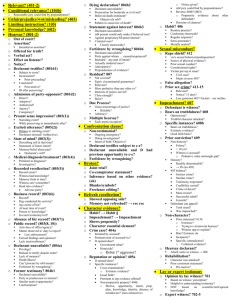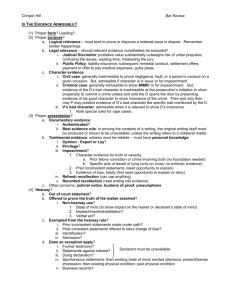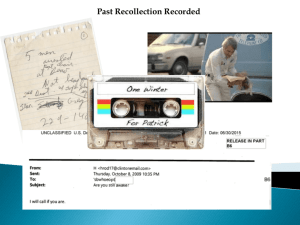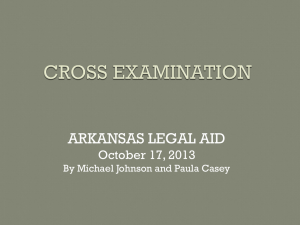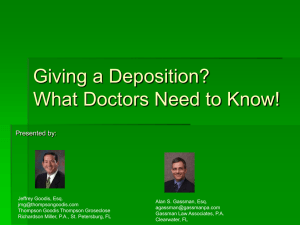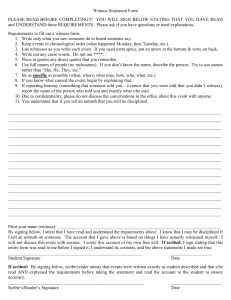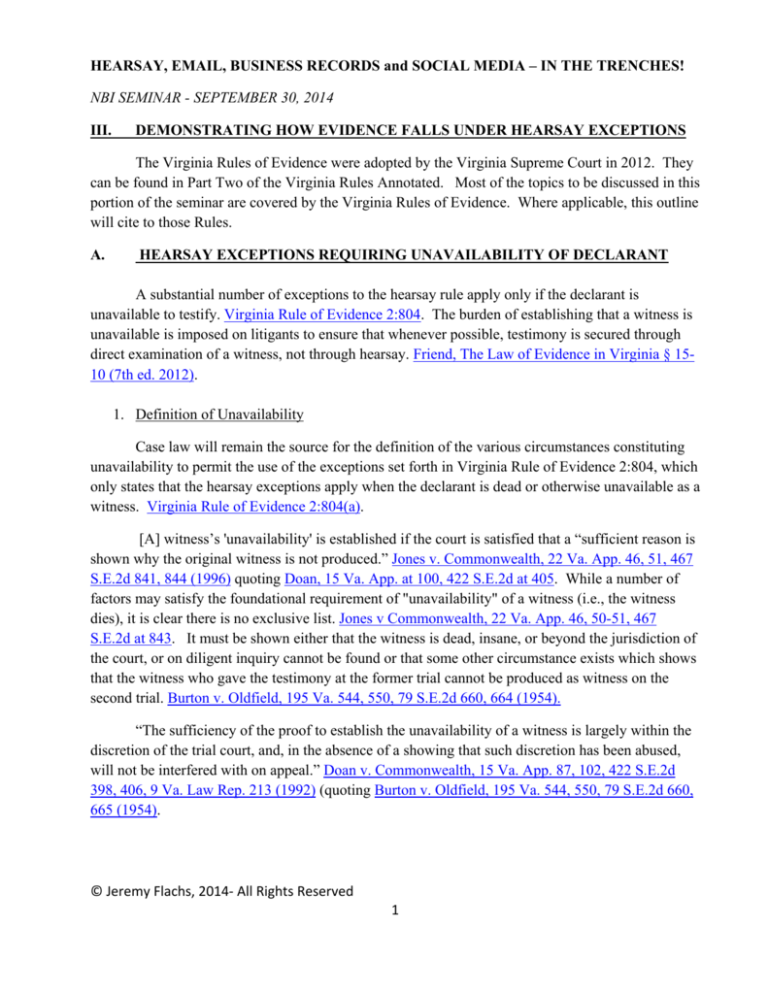
HEARSAY, EMAIL, BUSINESS RECORDS and SOCIAL MEDIA – IN THE TRENCHES!
NBI SEMINAR - SEPTEMBER 30, 2014
III.
DEMONSTRATING HOW EVIDENCE FALLS UNDER HEARSAY EXCEPTIONS
The Virginia Rules of Evidence were adopted by the Virginia Supreme Court in 2012. They
can be found in Part Two of the Virginia Rules Annotated. Most of the topics to be discussed in this
portion of the seminar are covered by the Virginia Rules of Evidence. Where applicable, this outline
will cite to those Rules.
A.
HEARSAY EXCEPTIONS REQUIRING UNAVAILABILITY OF DECLARANT
A substantial number of exceptions to the hearsay rule apply only if the declarant is
unavailable to testify. Virginia Rule of Evidence 2:804. The burden of establishing that a witness is
unavailable is imposed on litigants to ensure that whenever possible, testimony is secured through
direct examination of a witness, not through hearsay. Friend, The Law of Evidence in Virginia § 1510 (7th ed. 2012).
1. Definition of Unavailability
Case law will remain the source for the definition of the various circumstances constituting
unavailability to permit the use of the exceptions set forth in Virginia Rule of Evidence 2:804, which
only states that the hearsay exceptions apply when the declarant is dead or otherwise unavailable as a
witness. Virginia Rule of Evidence 2:804(a).
[A] witness’s 'unavailability' is established if the court is satisfied that a “sufficient reason is
shown why the original witness is not produced.” Jones v. Commonwealth, 22 Va. App. 46, 51, 467
S.E.2d 841, 844 (1996) quoting Doan, 15 Va. App. at 100, 422 S.E.2d at 405. While a number of
factors may satisfy the foundational requirement of "unavailability" of a witness (i.e., the witness
dies), it is clear there is no exclusive list. Jones v Commonwealth, 22 Va. App. 46, 50-51, 467
S.E.2d at 843. It must be shown either that the witness is dead, insane, or beyond the jurisdiction of
the court, or on diligent inquiry cannot be found or that some other circumstance exists which shows
that the witness who gave the testimony at the former trial cannot be produced as witness on the
second trial. Burton v. Oldfield, 195 Va. 544, 550, 79 S.E.2d 660, 664 (1954).
“The sufficiency of the proof to establish the unavailability of a witness is largely within the
discretion of the trial court, and, in the absence of a showing that such discretion has been abused,
will not be interfered with on appeal.” Doan v. Commonwealth, 15 Va. App. 87, 102, 422 S.E.2d
398, 406, 9 Va. Law Rep. 213 (1992) (quoting Burton v. Oldfield, 195 Va. 544, 550, 79 S.E.2d 660,
665 (1954).
© Jeremy Flachs, 2014‐ All Rights Reserved 1 2.
a.
The Most Cited Grounds for Unavailability
The Declarant is Dead1
b.
The Declarant is Too Ill to Testify
However, if the illness is temporary, a continuance might be more appropriate. Friend, The
Law of Evidence in Virginia § 15-10 (7th ed. 2012).
c.
The Declarant is Insane
d.
The Declarant is Absent From the State and the Party is Unable to Obtain the Declarant’s
Deposition
Absence from the Commonwealth is not sufficient to establish unavailability. The party
offering testimony from a former trial must establish that with reasonable diligence the deposition of
the absent witness could not be secured. Burton v Oldfield, 195 Va.544, 550 (1954). A witness who
cannot be located is not unavailable unless it can be shown that due diligence was exercised to locate
and attempt to subpoena the witness, unless such efforts would prove futile. McDonnough v.
Commonwealth, 25 Va. App. 120, 129, 486 S.E.2nd 570, 574 (1997) .
e. Loss of Memory or Fear of Testifying
A witness who cannot recall prior testimony and whose memory cannot be refreshed is
“unavailable” so long as he is not feigning lack of memory. However, even when feigning lack of
memory, if upon persistent refusal to testify despite judicial pressures and an order to testify,…, the
testimony of a witness may be declared unavailable and prior testimony may be admitted…. Sapp v.
Commonwealth, 263 Va.415, 427, 559 S.E.2d 645, 651 (2002). "Although the focus of the inquiry is
often directed to the absence of a witness, the analysis also applies to circumstances when the
witness is present, but for sufficient reasons the witness's testimony is unavailable." Sapp, 263 Va. at
424, 559 S.E.2d at 649.
f. Deportation
An alien whose visa had expired and who was deported to Pakistan was “unavailable.” “The
party offering the testimony bears the burden of establishing the witness’s unavailability.” Bennett v.
Commonwealth, 33 Va. App. 335, 347, 533 S.E.2d 22, 28 (2000). “A witness is not unavailable for
purposes of the . . . exception to the confrontation requirement unless the prosecutorial authorities
1
Under Virginia law, the “dying declaration” exception to the hearsay rule may only be used in prosecutions for homicide and is not applicable to civil cases. Virginia Rule of Evidence 2:804(b)(2) ‐ (Statement Made Under Belief of Impending Death). © Jeremy Flachs, 2014‐ All Rights Reserved 2 have made a good-faith effort to obtain his presence at trial." Barber v. Page, 390 U.S. 719, 724-25,
88 S. Ct. 1318, 20 L. Ed. 2d 255 (1968). A good faith effort requires due diligence. Due diligence
requires only a good faith, reasonable effort; it does not require that every possibility, no matter how
remote, be exhausted. McDonnough v. Commonwealth, 25 Va. App. 120, 128, 486 S.E.2d 570, 574
(1997).
g. Connivance of Opposing Party
Absence due to the connivance or the assistance of the opposing party will deem a witness
unavailable. Friend, The Law of Evidence in Virginia § 15-10 (7th ed. 2012).
h. The Declarant Cannot be Compelled to Testify Due To Incompetency or Privilege
A witness who by virtue of incompetency, privilege or taking the 5th is unable to testify is
also unavailable. Friend, The Law of Evidence in Virginia § 15-10 (7th ed. 2012).
3. Testimony To Be Offered If the Declarant is Dead or
Otherwise Unavailable per Rule of Evidence 2:804 (a)
a. Former Testimony - Va Rule of Evidence 2:804 (b)(1)
The availability of a witness has taken on increased importance since the US Supreme Court
opinion in Crawford v Washington, 541 U.S. 36 (2004) , which held that testimonial hearsay is
admissible against a defendant only if there has been an opportunity to cross examine the declarant
and the declarant is unavailable. Prior/former testimony is admissible if the witness is dead or
otherwise unavailable and the former testimony was under oath, the issues are substantially the
same, the parties must be the same or have a privity in interest, and the witness who is now testifying
as to what was stated a former trial must be able to testify with reasonable accuracy about the former
testimony. A certified transcript of prior testimony will suffice to establish the accuracy of the
former testimony.
b. Statement Against Interest - Va Rule of Evidence 2:804 (b)(3)
Rule 2:804(3)(A):
a statement against interest include statements made when the
declarant knew them to be against his pecuniary or proprietary interest, or which tend to subject the
declarant to civil liability.
Rule 2:804(3)(B):
a statement against interest will include statements that the declarant
knew when made tend to subject him to criminal liability.
This exception to the hearsay rule should not be confused with a “party admission” which does
not require unavailability. A party admission against interest could come in under either exception
© Jeremy Flachs, 2014‐ All Rights Reserved 3 where the party is unavailable. Friend, The Law of Evidence in Virginia § 15-13(b) (7th ed. 2012)
and Virginia Rule of Evidence 2:803(0).
Practice Pointer: A guilty plea by a non-party is inadmissible to establish the negligence of that
non-party. To qualify as an admission against interest the offering party must
establish the non-party was unavailable to attend the trial. Thus, a defendant cannot
introduce the plea of manslaughter entered by the driver of the car in which the
plaintiff was a passenger where the driver is incarcerated and the defendant failed to
use due diligence to procure his attendance at trial, and where the plaintiff passenger
was not a party to the criminal case. Ayala v. Aggressive Towing & Transp., Inc., 276
Va. 169, 661 S.E.2d 480 (2008). However, a guilty plea or plea of nolo contendre to a
traffic charge are admissible in a civil case to establish fault as it pertains to that
incident.
4. Statement of Personal or Family History - Va Rule of Evidence 2:804 (b)(4)
A statement made before the existence of the controversy, concerning family relationships or
pedigree of a person, made by a member of the family or relative. A pedigree declaration can be
used to establish family relationships, marriage, births and deaths, ancestry, identity and legitimacy.
Friend, The Law of Evidence in Virginia § 15-14 (7th ed. 2012).
5. Statement By a Party Incapable of Testifying - Va Rule of Evidence 2:804 (b)(5)
This section embodies the Dead Man’s Statute and cites and repeats the text of Va Code
8.01-397.2 The use of hearsay to establish evidence at trial is many times sought due to the death or
incompetency of one of the parties.
Practice Pointer: Va. Supreme Court Rule 4:7(a)(4) sets forth the conditions for using the
deposition testimony of any witness (party or non-party) in lieu of live testimony at trial.
Those conditions include death of the witness, the witness is more than 100 miles from
the place of trial or hearing or is out of the Commonwealth, the witness is unable to
attend due to age, illness, infirmity or imprisonment, the party offering the deposition has
been unable to subpoena the witness or the witness is a physician, surgeon, dentist,
chiropractor or registered nurse, who in the regular course of business treated or
examined any party…. The best course of action is to always use due diligence to
subpoena witnesses, or arrange a deposition if you know the witness is out of the area or
a listed healthcare provider who will not want to appear at trial.
2
Va Code 8.01‐397‐ Corroboration Required and Evidence Receivable When One Party Incapable of Testifying In an action by or against a person who, from any cause, is incapable of testifying, or by or against the committee, trustee, executor, administrator, heir, or other representative of the person so incapable of testifying, no judgment or decree shall be rendered in favor of an adverse or interested party founded on his uncorroborated testimony. In any such action, whether such adverse party testifies or not, all entries, memoranda, and declarations by the party so incapable of testifying made while he was capable, relevant to the matter in issue, may be received as evidence in all proceedings including without limitation those to which a person under a disability is a party. The phrase "from any cause" as used in this section shall not include situations in which the party who is incapable of testifying has rendered himself unable to testify by an intentional self‐inflicted injury. © Jeremy Flachs, 2014‐ All Rights Reserved 4 B.
EXCITED UTTERANCES
The Virginia Rules of Evidence hold that an excited utterance may be admissible regardless
of the availability of the declarant. Virginia Rule of Evidence 2803(2). This rule states that an
excited utterance is a spontaneous or impulsive statement prompted by a startling event or condition
and made with firsthand knowledge under circumstances negating deliberation. Some authorities
refer to this exception as the res gestae rule, but Friend suggests that the res gestae exception
encompasses more than excited utterances and that the use of the res gestae exception has been
“permanently sidelined” in Virginia. Friend, The Law of Evidence in Virginia § 15-18(a) (7th ed.
2012). The unguarded spontaneity is thought to provide the safeguard of trustworthiness otherwise
provided by the oath and cross examination. As is the case with many of the these issues, there
exists no fixed rule which can be applied and determine if the utterance was “excited” and the court
has discretion to make such determination on a case by case basis. Clark v. Commonwealth, 235
Va. 287, 292, 367 S.E.2nd 483, 486 (1988).
In Clark, the “excited utterance” was admissible. The victim had been shot at close range
twice in the chest. Trailing blood, he walked 492 feet seeking help. Within five to ten minutes, he
was observed to be grimacing, obviously "hurt and in pain." While he seemed to be "coherent,"
"conscious," and "calm," he "veered away" from a counter as he moved through the store. He "had
trouble breathing" and was bleeding from his chest and arm. Although he seemed to be "able to
deliberate" and understand what was being said, he was in "profound shock" and appeared "in an
almost death-like state" when examined in the hospital within five or ten minutes after he made the
statement. Moreover, the statement in issue was not responsive to any question from those in the
store. He was asked what had happened and, instead of relating what had occurred, he blurted the
identity of his assailant. Clark v. Commonwealth, 235 Va. 287 at 293.
Contrast Clark with Nicholaou v. Harrington, 217 Va. 618, 231 S.E.2d 318 (1977). In
Nicholaou, arising from a motor vehicle accident, an unidentified witness allegedly made
statements to the investigating police officer which were overheard by the defendant driver. The
statement said by the defendant to have been made by the unknown driver lacks the characteristics of
a spontaneous utterance. It was made at least six or seven minutes, probably longer, after the
accident, when the investigating officer was questioning the defendant about the event. There is no
suggestion that this was an excited declaration uttered in instinctive reaction to a startling event. The
court held the statement was inadmissible hearsay, the admitting the statement was prejudicial error
and reversed the judgment for defendant. Nicholaou v. Harrington, 217 Va. 618 at 622.
© Jeremy Flachs, 2014‐ All Rights Reserved 5 The time period between the starling event and the excited utterance is not always the critical
determining factor. For example, statements by children traumatized by murder or injury to family
members may be considered trustworthy and admissible as an excited utterance even several hours
after the startling event. The child was 3 years old. He was with alone with his mother when she was
attacked and remained with her as she bled to death (the child was found with a blood stained shirt).
The child was found by his father with the body. The child was then passed to several relatives, all
of whom testified the child appeared in shock. The statement at issue was made within an hour of
the child being discovered by his father in this condition. These circumstances and the fact the child
was visibly distressed and the statement was unsolicited were sufficient indicia of trustworthiness to
convince the court to admit the statement as an excited utterance. Braxton v. Commonwealth, 26 Va.
App. 176, 184-85, 493 S.E.2nd 688, 691-92 (1997).
Practice Pointer: Can a 911 call be admissible as an “excited utterance?” In part, the answer
will depend upon whether it is a civil or criminal case. A tape recording of a 911 call
which is made contemporaneously with the startling event, which explains the
startling event, and which is spontaneous may be admissible as an excited utterance.
Friend, The Law of Evidence in Virginia § 15-18(b) (7th ed. 2012), citing Wilder v.
Commonwealth, 55 Va. App. 579, 687 S.E.2nd 542 (2010). In Wilder, a homeless
man observed 2 men stealing goods from a business and called 911 during the course
of that theft and described the manner of the theft and described the two thieves.
While meeting the requirements set forth above, the statement was held inadmissible
because its admission violated the criminal defendant’s right to confront the witnesses
against him. The US Supreme Court has ruled that if the hearsay statement is
“testimonial in nature”, its admission violates the confrontation clause. Davis v.
Washington, 547 U.S. 813 (2006). A statement is nontestimonial and admissible
under the excited utterance (or present sense) exception only where the declarant is
facing an ongoing emergency that required immediate help. In Wilder the homeless
man was not in danger himself and was not facing an ongoing emergency, and
therefore the 911 call was testimonial and inadmissible in the criminal case. Because
the confrontation clause of the constitution applies only to criminal cases, the
homeless man’s 911 call in Wilder may very well be admissible in a civil case.
C.
PRESENT SENSE IMPRESSIONS
This exception is covered by Virginia Rule of Evidence 2:803(1) and does not require the
declarant to be unavailable. The rule provides that this exception is met with a spontaneous
statement describing or explaining an event or condition and made contemporaneously with, or
while, the declarant was perceiving the event or condition. Present sense declarations may be oral or
in writing. Friend, The Law of Evidence in Virginia § 15-19 (7th ed. 2012).
© Jeremy Flachs, 2014‐ All Rights Reserved 6 A significant difference between the present sense impression and an excited utterance is that
the present sense impression does not require a “startling event.” Friend, The Law of Evidence in
Virginia § 15-19 (7th ed. 2012). There is obviously some overlap in these two exceptions, and some
declarations could be admissible under both. The Confrontation Clause of the Constitution may
exclude statements otherwise admissible under these exceptions in criminal cases. This exception is
more useful in civil cases where the Confrontation Clause is not implicated.
The declaration may be made by one witnessing the event and there is no requirement that
the declaration be corroborated. The statement or declaration may be made to a nonparticipant. An
example of a declaration meeting this exception is the statement of the mother of the defendant who
spoke to the murder victim by telephone on the date the victim was murdered. The murder victim
told the defendant’s mother that “Freddie was with her in the shop.” This statement was made
contemporaneously and is trustworthy as “there was neither a memory problem nor time for a
calculated misstatement.” Foley v. Commonwealth, 8 Va. App. 149, 379 S.E.2nd 915 (1989).
D.
DECLARATIONS OF PRESENT STATE OF MIND
This exception is embodied as Virginia Rule of Evidence 2:803(3) and is titled “Then
Existing Mental, Emotional, or Physical Condition”. The rule requires a statement of the declarant’s
then existing state or mind, emotion, sensation, or physical condition (such as intent, plan, motive,
design, mental feeling, pain, and bodily health) but not including a statement of memory or belief to
prove the fact remembered or believed unless it relates to the execution…..of a will. The statements
of the declarant are admissible under this exception if his state of mind is relevant. Friend, The Law
of Evidence in Virginia § 15-20 (7th ed. 2012).
PRACTICE POINTER: Statements of a plaintiff in a personal injury case which establish that
he was in pain or emotionally distraught are admissible under this rule where the
statement refers to a presently existing state of mind and there is no indication of
fabrication. So long as the declaration reflects the declarant’s present mental or
emotional state, it may relate to an event or matters occurring in the past or future.
For example, a statement by a plaintiff expressing fear or worry about a future
surgery needed due to a vehicle crash or other event causing liability will be
admissible under the exception. As there is no requirement that the declarant be
unavailable, declarations of pain and emotional distress may be admissible through
the testimony of the plaintiff, even if appearing self- serving. Friend, The Law of
Evidence in Virginia § 15-20(a) (7th ed. 2012); Parsons v. Commonwealth, 138 Va.
764, 781, 121 S.E. 68, 72-73 (1924).
© Jeremy Flachs, 2014‐ All Rights Reserved 7 E.
PAST RECOLLECTION RECORDED
This exception is embodied as Virginia Rule of Evidence 2:803(5) and is titled “Recorded
Recollection.” This rule requires the following:
1. that there be a memorandum or record concerning a matter about which a witness once
had firsthand knowledge;
2. that the record or memorandum was made or adopted by the witness at or near the time
of the event;
3. that the record or memorandum was made or adopted while the witness had a clear and
accurate memory of it;
4. the witness lacks a present recollection of the event, and
5. the witness vouches for the accuracy of the written memorandum.
If admitted, the memorandum or record may be read into evidence, but may not itself be
received as an exhibit unless offered by the adverse party.
Present recollection refreshed and past recollection recorded, while often confused, are quite
distinct. Although past recollection recorded pertains primarily to written documents, and requires
that the above listed 5 requirements be met, counsel may use literally anything under the sun to
refresh a witness's present memory, even if the evidence is not admissible in the proceedings.
Beyond the requirement that the opposing party must be given an opportunity to examine the
material used to refresh [present] recollection, there seems to be little or no restriction on its
use, except that the courts repeatedly emphasize that the memory must in fact be refreshed,
and that the witness must, after examining the material, be able to speak from his or her own
refreshed memory, and not from the source of the refreshment. It appears that the witness
need not even put aside the material, but may continue to refer to it while testifying. Staton v.
King, 62 Va. Cir. 469 at 471 (Va. Cir. Ct. 2003).
A document used for past recollection recorded is utilized in the same manner as an
interrogatory answer or deposition testimony. It is read to the jury from the witness stand, but unless
offered by the adverse party, is not admitted and read by the jury. In this manner the contents of the
document are not elevated in importance above other testimony. This is also the rationale for not
admitting discovery pleadings and responses or deposition testimony in written form. Scott v
Greater Richmond Transit Co., 241 Va. 300, 305, 402 S.E. 2nd 214, 218 (1991). In Scott, a bus
company investigator testified that he remembered writing out a statement from a passenger in the
car on the day of the bus accident, but that he had no recollection of what the passenger had told him
regarding the details of the accident. The court admitted the following statement as a past
recollection recorded:
© Jeremy Flachs, 2014‐ All Rights Reserved 8 : Ms. Iris Scott stated that she was entering the parked car on right side, she had seated [sic] and
was closing the door when it was struck by a passing bus. [S]he saw the bus before entering the car,
was trying to get her umbrella in the door. Scott held that the statement was properly read to the
jury as the past recollection recorded of the bus investigator, but also held that the statement itself
should not have been admitted. The Court also ruled that the use of this statement did not violate
Va. Code §8.01-404 which prohibits the use of a witness’ statement to contradict the witness at trial.
The Court ruled that because the bus investigator’s statement (which recorded what the witness
stated to him) was neither signed by the witness nor in the witness’ handwriting, §8.01-404 does not
prohibit the use of a statement. Scott, 241 Va. 300, 302-303. Nor does the use of a transcript made
from a prior recorded telephone conversation between an accident victim and the insurance company
for a motorist to refresh the victim's recollection implicate the prohibitions in § 8.01-404 and the
circuit court did not err by permitting such use. Ruhlin v. Samaan, 282 Va. 371, 718 S.E.2d 447,
2011 (2011). The defendant’s use of the transcript of Ruhlin's telephone conversation was limited to
refreshing Ruhlin's recollection concerning the content of the conversation. The defendant did not
introduce the transcript into evidence, quote it in open court, or even identify it to the jury. After
Ruhlin reviewed the transcript, the defendant questioned Ruhlin about the telephone conversation
without regard or reference to the document itself, and Ruhlin testified from his independent
memory of his conversation with the insurance company. In addition, Ruhlin's responses to the
questions about this conversation did not "contradict" his prior testimony. The Court ruled that the
statement was properly used to refresh the recollection of the plaintiff. Ruhlin, 282 Va. 371 at 379380.
F.
PUBIC RECORDS AND REPORTS
Virginia Rule of Evidence 2:803(8) sets forth the public records exception as follows:
[R]ecords, reports, statements or data compilations, in any form, prepared by the public offices or
agencies, setting forth :
A. the activities of the office or agency; or
B. Matters observed within the scope of the office or agency’s duties, as to which the source
of the recorded information could testify if called as a witness; generally excluding,
however, in criminal cases matters observed by police officers and other law enforcement
personnel when office against a criminal defendant.
The justification for this rule lies in the assumed inherent trustworthiness of documents
prepared according to statute or by nature of the office.
1. POLICE CRASH REPORTS (§ 46.2-379)
This statute governs the use of crash reports made by investigating officers at trial. All crash reports made by investigating officers shall be for the confidential use
of the Department and of other state agencies for accident prevention purposes and shall not be used
Code § 46.2-379 :
© Jeremy Flachs, 2014‐ All Rights Reserved 9 as evidence in any trial, civil or criminal, arising out of any accident. If otherwise authorized by law,
the Department may disclose from the reports, on request of any person, the date, time, and location
of the accident and the names and addresses of the drivers, the owners of the vehicles involved, the
injured persons, the witnesses, and one investigating officer.
As we have previously stated, "the rationale of the statute is that the report, although routinely and sometimes
hurriedly made, . . . nevertheless carries with it the stamp of a written and official document to which a jury
could attach more weight than it is properly due." Acuar v. Letourneau, 260 Va. 180, 531 S.E.2d 316, 319
(2000). In Phillips v. Schools, 211 Va. 19, 175 S.E.2d 279 (1970), the plaintiff's attorney sought to crossexamine the defendant about a prior statement by making specific reference to an accident report. The trial
court sustained the objection to such cross examination and the ruling was upheld on appeal on the ground
that it is improper to make any mention of the report in the presence of the jury. Phillips, 211 Va. at 22-23,
175 S.E.2d at 281. On the other hand, it is proper to furnish the investigating police officer with a copy of the
officer's accident report for the purpose of refreshing the officer's memory, but it is improper cross examine
the officer by asking how the officer had refreshed his recollection regarding the accident and referencing the
accident report. Davis v. Colgin, 219 Va. 5, 6, 244 S.E.2d 750, 751 (1978). Even though the report was not
introduced into evidence, this Court held that "no reference" should have been made to the report by either
party or their counsel. Id. at 8, 244 S.E.2d at 751.
In Acuar, supra, the accident report was not introduced into evidence, but there were numerous
references to it by not only the officer but also the court and Letourneau's attorney. The report was referred to
at times by the terms “diagram” and “report”. This amounted to nothing less than an official stamp being
placed on the document used to refresh Mills' recollection. Thus, the jury could have placed more weight on
Mills' testimony than it might otherwise have done and the trial court erred in allowing the repeated
references to the accident report. Nor were the references harmless error. The improper references to the
police report in the presence of the jury provided a "stamp of a written and official document that
implicitly accompanies an accident report and improperly enhanced the testimony of the officer" and
the case was remanded for a new trial. Acuar v. Letourneau, 260 Va. 180 at 188.
Field notes do not constitute a crash report. Where plaintiff did not offer in evidence a
portion of the report itself, but only sought to introduce the statement recorded by the trooper in his
field notes, admission of the statement was not barred by this section even though the statement later
appeared in the accident report. Cherry v. D.S. Nash Constr. Co., 252 Va. 241, 475 S.E.2d 794
(1996).
PRACTICE POINTER: If you need evidence that is found in a crash report, and if the officer
cannot recall the testimony without looking at his report, you may request that the
officer testify from relevant portions from the crash report without referencing the
fact that document is a crash report. This matter should probably be addressed in a
motion in limine. As a predicate, the proponent of such testimony will need to
establish: (1) that the officer had firsthand knowledge of the matters to which he is
asked to testify, (2) that the only written statements recording that knowledge is the
accident report which was prepared at or near the time of the investigation, (3) that
© Jeremy Flachs, 2014‐ All Rights Reserved 10 the officer lacks a present recollection of the investigation, and (4) that the officer can
vouch for the accuracy of the written memorandum. Neither the officer nor counsel
may identify the writing or the accident report. Nor may either party seek to admit
the report into evidence. Staton v. King, 62 Va. Cir. 469 at 476 (Va. Cir. Ct. 2003).
2. Certificates of Analysis
The admissibility of certificates of analysis are crucial to establishing a prima facie case in a
drunk driving case for recovering punitive damages under Va. Code §8.01-44.5, which requires
evidence of a BAC of 0.15 or above.
a. Blood Test
When a blood sample taken in accordance with the provisions of §§ 18.2-268.2 through
18.2-268.6 is forwarded for analysis to the Department, a report of the test results shall be filed in
that office. Upon proper identification of the certificate of withdrawal, the certificate of analysis,
with the withdrawal certificate attached, shall, when attested by the Director, be admissible in any
court as evidence of the facts therein stated and of the results of such analysis (i) in any criminal
proceeding, provided the requirements of subsection A of § 19.2-187.1 have been satisfied and the
accused has not objected to the admission of the certificate pursuant to subsection B of § 19.2-187.1,
or (ii) in any civil proceeding. Va. Code §18.2-268.7 (C).
b. Breath Test
Virginia Code § 18.2-268.9 creates the standard for admissibility of the breath test
results. This section provides [a]ny individual conducting a breath test under the provisions of §
18.2-268.2 shall issue a certificate which will indicate that the test was conducted in accordance
with the Department's specifications, the name of the accused, that prior to administration of the test
the accused was advised of his right to observe the process and see the blood alcohol reading on the
equipment used to perform the breath test, the date and time the sample was taken from the accused,
the sample's alcohol content, and the name of the person who examined the sample. This certificate,
when attested by the individual conducting the breath test on equipment maintained by the
Department, shall be admissible in any court as evidence of the facts therein stated and of the results
of such analysis (i) in any criminal proceeding, provided that the requirements of subsection A of §
19.2-187.1 have been satisfied and the accused has not objected to the admission of the certificate
pursuant to subsection B of § 19.2-187.1, or (ii) in any civil proceeding. Any such certificate of
analysis purporting to be signed by a person authorized by the Department shall be admissible in
evidence without proof of seal or signature of the person whose name is signed to it.
PRACTICE POINTER: In any civil case where the Plaintiff needs to produce evidence of a
blood alcohol level of at least 0.15 to establish punitive damages, the shortest route to
victory is to secure the Certificate of Analysis with the signature of an authorized
employee of the Department of Forensic Science.
© Jeremy Flachs, 2014‐ All Rights Reserved 11 3. Records from the Department of Motor Vehicles, Excepting Including Crash Reports
Virginia Rule of Evidence 2:803(8), set forth below, is the Government Records exception to
the hearsay rule.
2:803. The following are not excluded by the hearsay rule, even though the declarant is
available as a witness:
(8) In addition to categories of government records made admissible by statute, records,
reports, statements, or data compilations, in any form, prepared by public offices or
agencies, setting forth (A) the activities of the office or agency, or (B) matters observed
within the scope of the office or agency's duties, as to which the source of the recorded
information could testify if called as a witness; generally excluding, however, in criminal
cases matters observed by police officers and other law enforcement personnel when offered
against a criminal defendant.
Virginia Code Section 46.2-215 allows for admissibility of copies of DMV records so long as
the records are otherwise admissible and are attested by the Commissioner or his designee.
Section 46.2-215 only facilitates the admissibility of DMV records, but does not itself carve
out an exception to the hearsay rule. To be admissible, the records must meet an exception to the
hearsay rule.
Several criminal cases have allowed introduction of records from the Department of Motor
Vehicles in criminal cases. A public record which contained a picture, a signature, and the number
assigned by the Department of Motor Vehicles to that picture and signature was introduced in
defendant's embezzlement trial. Because it was properly authenticated, it was admissible under the
public records exception to the hearsay rule. Jacobs v. Commonwealth, No. 0874-02-3, 2003 Va.
App. LEXIS 389 (Ct. of Appeals July 8, 2003)(not designated for publication). If properly
authenticated, a transcript of defendant's driving record which contains facts known to the
commissioner is admissible to prove that the defendant's license has been revoked. Ingram v.
Commonwealth, 1 Va. App. 335, 338 S.E.2d 657 (1986). A Department of Motor Vehicles
transcript, certified pursuant to § 46.2-215, was prima facie evidence of the facts stated therein and
was therefore sufficient to prove defendant's prior DUI offenses and support his conviction under §§
18.2-266 and 18.2-270. Mitchem v. Commonwealth, 2010 Va. App. LEXIS 18 (Jan. 12, 2010)(not
designated for publication).
This hearsay exception had a “personal knowledge” component which seemingly required
the government official to have personal knowledge of the matters set forth in the records. As noted
by Friend, government officials do not have true personal knowledge of the facts contained in
government documents. Friend, The Law of Evidence in Virginia § 15-23(a) (7th ed. 2012).
Instead, the government official need only make the entry based on information received from
another government official for the “personal knowledge” requirement to be satisfied. The Court
© Jeremy Flachs, 2014‐ All Rights Reserved 12 reasoned that the statutory requirement that the Clerk of Court file the habitual offender order with
the Department of Motor vehicles, which is required to maintain accurate records, combined with the
fact that the DMV officials could have been called to confirm they properly performed their duties
and that the records are accurate, is enough to satisfy the personal knowledge requirement to admit
into evidence a DMV computer printout of the defendant’s driving record. Smoot v Commonwealth,
18 Va. App. 562, 565, 445 S.E.2nd 688 (1994).
Virginia Rule of Evidence 2:803(8) does not seem to require personal knowledge in the
traditional sense. Instead Part (B) of the rule states that matters observed within the scope of the
office or agency's duties, as to which the source of the recorded information could testify if called as
a witness are admissible under this subsection. That phrase suggests that so long as the documents
or records were recorded or generated pursuant to official business, the custodian of the information
need not have personal knowledge.
4. Use of Pleas to Traffic Charges in Civil Cases
Virginia Code § 8.01-418 states whenever, in any civil action, it is contended that any party
thereto pled guilty or nolo contendere or suffered a forfeiture in a prosecution for a criminal offense or traffic
infraction which arose out of the same occurrence upon which the civil action is based, evidence of said plea
or forfeiture as shown by the records of the criminal court shall be admissible. Where the records of the court
in which such prosecution was had are silent or ambiguous as to whether or not such plea was made or
forfeiture occurred, the court hearing the civil case shall admit such evidence on the question of such plea or
forfeiture as may be relevant, and the question of whether such plea was made or forfeiture suffered shall be
a question for the court to determine.
Note that a plea of nolo contendere is admissible. However, in the absence of a plea, a
judgment of conviction is inadmissible in a related civil case.
PRACTICE POINTER: If you represent a defendant charged with a traffic violation which
may result in civil liability, you should be cautious about pleading guilty. If you
represent the potential plaintiff, you should consider hiring a court reporter to take
down any testimony at the hearing on the traffic charge and when feasible, lobby the
Commonwealth on behalf of your client to try the case if the defendant will not plead
guilty. It is all too common that a needed witness, such as the civil plaintiff, fails to
appear at the trial and the charges are dismissed.
© Jeremy Flachs, 2014‐ All Rights Reserved 13


